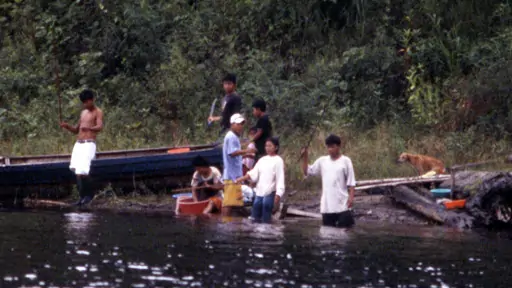Indigenous Calendar August, 2016: Genocide, Ethnocide, Justice and the Cocama of Peru

Seventy-one years after the end of World War Two we are still dealing with the fallout. A year ago, Oskar Gröning, also known as the "bookkeeper of Auschwitz," received a four-year prison sentence for his role in the murders that took place there. Many observers suggested at the time that Gröning's might be the last ever legal case to be prosecuted against a former Nazi. But just six weeks ago Reinhold Hanning, a guard at Auschwitz, received a five-year prison sentence. Then, last month, Helmut Oberlander successfully appealed — for the third time — against a ruling to revoke his Canadian citizenship for his part in WWII.
A co-plaintiff in the Gröning case spoke about the educational effect that the decision might have on current generations. The lessons of WWII appear not to have come to fruition yet, given the genocides that have followed it. It should come as no surprise that the genocide perpetrated by the Communist Party of Kampuchea (better known as the Khmer Rouge) in Cambodia between 1975 and 1979 still affects the lives of many people. The legal pursuit of its perpetrators continues — albeit at a very slow pace. Nuon Chea and Khieu Samphan are the latest to be convicted of war crimes and crimes against humanity; both men appealed their conviction. They entered their 90s and mid-80s respectively last month as their appeal hearings continued. There is a chance they will no longer be alive when the appeals are finally decided or when the verdict on genocide charges against them is reached.
A more recent genocide took place in Guatemala in the early 1980s. There, the former dictator José Efraín Ríos Montt had been found guilty of genocide in May, 2013 and sentenced to 80 years in prison — he was 87 years old. His latest trial was halted three months ago with no date for a retrial yet announced. It is conceivable that he, too, will evade justice.
In the cases of both Cambodia and Guatemala a significant number of the victims were indigenous people. The indigenous people in this month's photo are the Cocama who live mainly in Peru. While the first documented contact between the Cocama and Europeans was back in 1557, mass contact is much more recent. Indeed, apart from their modern dress, these Cocama appeared to me, as I approached their village deep in the Peruvian Amazon, much like they would have to the Spanish 450 years earlier.
The Cocama now have regular contact with the outside world. Those in this photo are typical in that they have lost much of their culture in only the last two generations. Spanish is now their first language and Catholicism their major religion. This kind of loss of culture is what we mean by a term related to genocide: 'ethnocide.'
There are other indigenous peoples in Peru who still have little or no outside contact — by choice. One such people are the Mashco Piro (also known as the Cujareño). However they have been contacted increasingly during the past few years. One form of that contact takes the form of so-called 'tribal tourism.' Tourism in indigenous communities can be undertaken with sensitivity and for mutual benefit. But often it is fraught with disrespect and even abuse. Unless that changes, groups like the Cocama and the Mashco Piro will become the newest victims of ethnocide.
If you enjoyed reading this article, please consider supporting independent, advertising-free journalism by buying us a coffee to help us cover the cost of hosting our web site. Please click on the link or scan the QR code. Thanks!


